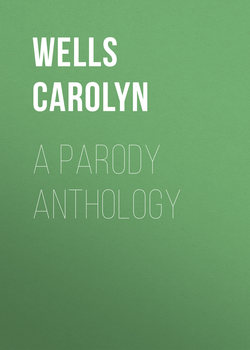Читать книгу A Parody Anthology - Wells Carolyn - Страница 19
AFTER SOUTHEY
ОглавлениеTHE OLD MAN'S COLD AND HOW HE GOT IT
(By Northey-Southey-Eastey-Westey)
"YOU are cold, Father William," the young man cried,
"You shake and you shiver, I say;
You've a cold, Father William, your nose it is red,
Now tell me the reason, I pray."
"In the days of my youth," Father William replied —
(He was a dissembling old man)
"I put lumps of ice in my grandpapa's boots,
And snowballed my Aunt Mary Ann."
"Go along, Father William," the young man cried,
"You are trying it on, sir, to-day;
What makes your teeth chatter like bone castanets?
Come tell me the reason, I pray."
"In the days of my youth," Father William replied,
"I went to the North Pole with Parry;
And now, my sweet boy, the Arc-tic doloreaux
Plays with this old man the Old Harry."
"Get out! Father William," the young man cried.
"Come, you shouldn't go on in this way;
You are funny, but still you've a frightful bad cold —
Now tell me the reason, I pray."
"I am cold, then, dear youth," Father William replied;
"I've a cold, my impertinent son,
Because for some weeks my coals have been bought
At forty-eight shillings a ton!"
FATHER WILLIAM
"YOU are old, Father William," the young man said,
"And your hair has become very white;
And yet you incessantly stand on your head —
Do you think, at your age, it is right?"
"In my youth," Father William replied to his son,
"I feared it might injure the brain;
But now that I'm perfectly sure I have none,
Why, I do it again and again."
"You are old," said the youth, "as I mentioned before,
And grown most uncommonly fat;
Yet you turned a back-somersault in at the door —
Pray what is the reason of that?"
"In my youth," said the sage, as he shook his gray locks,
"I kept all my limbs very supple
By the use of this ointment – one shilling the box —
Allow me to sell you a couple."
"You are old," said the youth, "and your jaws are too weak
For anything tougher than suet;
Yet you finished the goose, with the bones and the beak;
Pray, how did you manage to do it?"
"In my youth," said his father, "I took to the law,
And argued each case with my wife;
And the muscular strength which it gave to my jaw,
Has lasted the rest of my life."
"You are old," said the youth, "one would hardly suppose
That your eye was as steady as ever;
Yet you balanced an eel on the end of your nose —
What made you so awfully clever?"
"I have answered three questions and that is enough,"
Said his father; "don't give yourself airs!
Do you think I can listen all day to such stuff?
Be off, or I'll kick you downstairs!"
Lewis Carroll
LADY JANE
(Sapphics)
DOWN the green hill-side fro' the castle window
Lady Jane spied Bill Amaranth a-workin';
Day by day watched him go about his ample
Nursery garden.
Cabbages thriv'd there, wi' a mort o' green-stuff —
Kidney beans, broad beans, onions, tomatoes,
Artichokes, seakale, vegetable marrows,
Early potatoes.
Lady Jane cared not very much for all these:
What she cared much for was a glimpse o' Willum
Strippin' his brown arms wi' a view to horti-
Cultural effort.
Little guessed Willum, never extra-vain, that
Up the green hill-side, i' the gloomy castle,
Feminine eyes could so delight to view his
Noble proportions.
Only one day while, in an innocent mood,
Moppin' his brow (cos 'twas a trifle sweaty)
With a blue kerchief – lo, he spies a white un
Coyly responding.
Oh, delightsome Love! Not a jot do you care
For the restrictions set on human inter-
Course by cold-blooded social refiners;
Nor do I, neither.
Day by day, peepin' fro' behind the bean-sticks,
Willum observed that scrap o' white a-wavin',
Till his hot sighs out-growin' all repression
Busted his weskit.
Lady Jane's guardian was a haughty Peer, who
Clung to old creeds and had a nasty temper;
Can we blame Willum that he hardly cared to
Risk a refusal?
Year by year found him busy 'mid the bean-sticks,
Wholly uncertain how on earth to take steps.
Thus for eighteen years he beheld the maiden
Wave fro' her window.
But the nineteenth spring, i' the castle post-bag,
Came by book-post Bill's catalogue o' seedlings
Mark'd wi' blue ink at "Paragraphs relatin'
Mainly to Pumpkins."
"W. A. can," so the Lady Jane read,
"Strongly commend that very noble Gourd, the
Lady Jane, first-class medal, ornamental;
Grows to a great height."
Scarce a year arter, by the scented hedgerows —
Down the mown hill-side, fro' the castle gateway —
Came a long train and, i' the midst, a black bier,
Easily shouldered.
"Whose is yon corse that, thus adorned wi' gourd leaves
Forth ye bear with slow step?" A mourner answer'd,
"'Tis the poor clay-cold body Lady Jane grew
Tired to abide in."
"Delve my grave quick, then, for I die to-morrow.
Delve it one furlong fro' the kidney bean-sticks,
Where I may dream she's goin' on precisely
As she was used to."
Hardly died Bill when, fro' the Lady Jane's grave,
Crept to his white death-bed a lovely pumpkin:
Climb'd the house wall and over-arched his head wi'
Billowy verdure.
Simple this tale! – but delicately perfumed
As the sweet roadside honeysuckle. That's why,
Difficult though its metre was to tackle,
I'm glad I wrote it.
A. T. Quiller-Couch.
